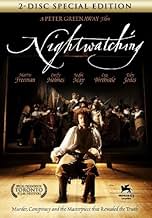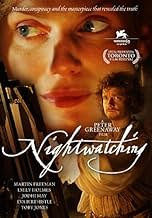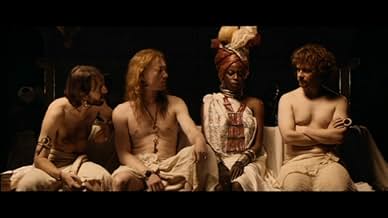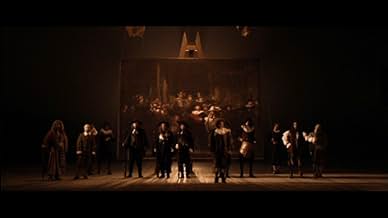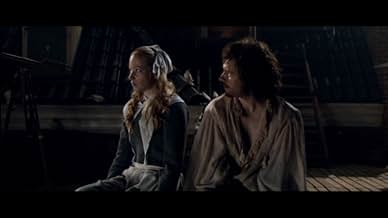IMDb RATING
6.5/10
3.6K
YOUR RATING
An extravagant, exotic and moving look at Rembrandt's romantic and professional life, and the controversy he created by the identification of a murderer in the painting 'The Night Watch'.An extravagant, exotic and moving look at Rembrandt's romantic and professional life, and the controversy he created by the identification of a murderer in the painting 'The Night Watch'.An extravagant, exotic and moving look at Rembrandt's romantic and professional life, and the controversy he created by the identification of a murderer in the painting 'The Night Watch'.
- Awards
- 6 wins & 6 nominations total
Anja Antonowicz
- Catharina
- (as Anna Antonowicz)
- Director
- Writer
- All cast & crew
- Production, box office & more at IMDbPro
Featured reviews
Nightwatching (2007)
Highly original, deliberately false, playing loose with fact, frankly sexual, and dry and cold. And not very interesting.
It's fair to say very few people will like this movie, even among those inclined to watch it in the first place, even among fans of the director Peter Greenaway. Luckily, there will be those few who will find it so stylized, startling, offbeat, and intense as to love it. It does suggest something brilliant in the pretty murk it also is. And the actors are performing their hearts out, every one of them pushing their emotional limits within the crisp, dry set designs, which are stiff, symmetrical, and stagey. And beautiful.
There is no question this is an "art" film, highly controlled and aesthetic head to toe. The photography has a kind of studio controlled fluidity, not the moving camera of a steadicam or classic Hollywood, but a steady, slow tracking horizontally inward or sliding sideways. This helps keep the scenes alive, a little, but it also adds to the drone of the whole, since the movement is nearly always the same. In a way, the camera is in synch with the sets, which are also similar in scale and proportion throughout, and symmetrical.
What's it about? Rembrandt and his two wives and one known lover (all compressed into one invented time frame). That's not bad material for a movie, but there is also the political intrigue that Greenaway inserts, a confusing and dull affair with vain attempts to mimic (I think) the drama of the Da Vinci code (the book, not the movie). "Nightwatching" has almost a second plot which comes out of a fantastical reinterpretation of the most monumental of Rembrandt's paintings, "Nightwatch." Greenaway as both writer and director became convinced (or at least wanted to create that impression) that a conspiracy was built into the symbolism of the painting, even a murder. (A second disc in the deluxe DVD edition has a documentary exploring this.) It might have worked, but it's just poorly constructed and the writing is willfully obtuse. amidst the larger sexual and social threads of the main plot, this other idea is an intrusion.
What is missing almost completely in this 2 ¼ hour is any sense of Rembrandt the painter. His personality, his personal life, his apparent rebelliousness are all evident, but the artist, and the art, is missing. The one thing this obsession leads to is some crisp photography of the one painting, and though the shots go by too fast, it's revealing to see up close Rembrandt's rough style, which was more and more at odds with the Dutch tendency for detail (a direction Vermeer typifies a couple decades later).
For people familiar with contemporary theater, this is it on film. It looks great and has passion. But it's just not very interesting. The writing is strained, and the ideas thin. Most of all, it's indulgent. A lot of talent squandered.
Highly original, deliberately false, playing loose with fact, frankly sexual, and dry and cold. And not very interesting.
It's fair to say very few people will like this movie, even among those inclined to watch it in the first place, even among fans of the director Peter Greenaway. Luckily, there will be those few who will find it so stylized, startling, offbeat, and intense as to love it. It does suggest something brilliant in the pretty murk it also is. And the actors are performing their hearts out, every one of them pushing their emotional limits within the crisp, dry set designs, which are stiff, symmetrical, and stagey. And beautiful.
There is no question this is an "art" film, highly controlled and aesthetic head to toe. The photography has a kind of studio controlled fluidity, not the moving camera of a steadicam or classic Hollywood, but a steady, slow tracking horizontally inward or sliding sideways. This helps keep the scenes alive, a little, but it also adds to the drone of the whole, since the movement is nearly always the same. In a way, the camera is in synch with the sets, which are also similar in scale and proportion throughout, and symmetrical.
What's it about? Rembrandt and his two wives and one known lover (all compressed into one invented time frame). That's not bad material for a movie, but there is also the political intrigue that Greenaway inserts, a confusing and dull affair with vain attempts to mimic (I think) the drama of the Da Vinci code (the book, not the movie). "Nightwatching" has almost a second plot which comes out of a fantastical reinterpretation of the most monumental of Rembrandt's paintings, "Nightwatch." Greenaway as both writer and director became convinced (or at least wanted to create that impression) that a conspiracy was built into the symbolism of the painting, even a murder. (A second disc in the deluxe DVD edition has a documentary exploring this.) It might have worked, but it's just poorly constructed and the writing is willfully obtuse. amidst the larger sexual and social threads of the main plot, this other idea is an intrusion.
What is missing almost completely in this 2 ¼ hour is any sense of Rembrandt the painter. His personality, his personal life, his apparent rebelliousness are all evident, but the artist, and the art, is missing. The one thing this obsession leads to is some crisp photography of the one painting, and though the shots go by too fast, it's revealing to see up close Rembrandt's rough style, which was more and more at odds with the Dutch tendency for detail (a direction Vermeer typifies a couple decades later).
For people familiar with contemporary theater, this is it on film. It looks great and has passion. But it's just not very interesting. The writing is strained, and the ideas thin. Most of all, it's indulgent. A lot of talent squandered.
A good film but long, and one has to be something of an aficionado of Greenaway to enjoy this one. Beautifully lit and visually composed with an insistent Nymanesque score and a witty script this not only benefits from but demands several viewings from the Stoppard of cinema. I warmed to Martin Freeman as Rembrandt, a new actor to me, as the film went on for his combination of high art, low sex and comfortable domesticity. He was no more moral than those whose foibles he sought to expose, but he was certainly more likable. It is not really possible to follow the 33 people (and dog) in the eponymous painting and the mysteries tat Greenaway seeks to solve, which make more sense in his documentary "Rembrandt's J'Accuse" than they do in this film – both are packaged together in the DVD. I would not say this is less demanding than his recent films, though it is certainly more accessible, and his best since the scandalously unavailable "Drowning by Numbers".
My advice is to first watch 'Rembrandt's J'Accuse', Greenaway's companion film. It fills you in on the background, the characters, the thesis for the conspiracy, and generally sets the scene for 'Nightwatching' itself, which is extremely elaborate and requires a far more prolonged degree of concentration than 99.9% of films being released. Having said that, the film certainly stands alone as a powerful and intelligent piece of cinema that puts forward a contentious and challenging theory about the circumstances surrounding Rembrandt's painting.
Some viewers have pointed out how moving the film is - and indeed it is. But I for one have found ALL of Greenaway's films to be deeply moving. Unlike mainstream directors, he doesn't attempt to tug at the heartstrings, but instead deploys one rich, elegaic, achingly beautiful set piece after another, letting the ideas and associations reach the emotions of the audience. In Greenaway's world, extreme beauty and extreme horror exist cheek-by-jowl - his heroes (more so than his heroines) look for logic and order, and find ultimately chaos and decay - the good go unrewarded, the bad go unpunished - and yet, out of it all, rises a triumphant celebration of life, art, human aspiration, and the possibilities of cinema itself.
If you want a bedtime story about goodies overcoming baddies, look elsewhere. 'Nightwatching', like Greenaway's other work, offers - and demands - much more than that.
Some viewers have pointed out how moving the film is - and indeed it is. But I for one have found ALL of Greenaway's films to be deeply moving. Unlike mainstream directors, he doesn't attempt to tug at the heartstrings, but instead deploys one rich, elegaic, achingly beautiful set piece after another, letting the ideas and associations reach the emotions of the audience. In Greenaway's world, extreme beauty and extreme horror exist cheek-by-jowl - his heroes (more so than his heroines) look for logic and order, and find ultimately chaos and decay - the good go unrewarded, the bad go unpunished - and yet, out of it all, rises a triumphant celebration of life, art, human aspiration, and the possibilities of cinema itself.
If you want a bedtime story about goodies overcoming baddies, look elsewhere. 'Nightwatching', like Greenaway's other work, offers - and demands - much more than that.
I'm really amazed with the work Peter Greenaway did in this movie. I have seen most of his films and this one is now my favourite. It's impressive the way the made every frame a moving Rembrandt's painting. This is pure art cinema. The story is told in a creative way, you can understand the clever mind of Rembrandt, follow his steps in his life focused on his most famous painting "The Night Watch", it could be a "slow" movie but the way "Rembrandt" tells the story makes it smooth; dramatic, funny, and smart. I could frame this movie on a museum. The "Holland" world is perfectly shown, the costume design is superb; every single detail in the movie takes you to 1642. To appreciate this movie you must know who Peter Greenaway is and understand why "cinema" is the 7th art.
In my old Balkan country, we used to have a wise saying warning against bothering with a huge sack to collect fruit from a famous fruit tree. This applies almost perfectly to the last Peter Greenway's Anglo-Polish-Dutch super production, around the creation of NIGHT WATCH, one of the most famous paintings in the world. Assassination attempts were performed against this masterpiece, resulting in its sheltering behind a thick glass in the Rijk Museum, and the same shelter may be used against this strange assembly of four-letter words, (predominant in modern movies), naked bodies sometimes sculptural, sometimes dull, and a certain research in the lighting; after almost 150 minutes of sometimes boring, sometimes nonsensical dialogues, the viewer hits home with the impression that his money was stolen. Only two movie theaters adventured to expose this failure (in my eyes, but the audience was heavy and very receptive), at my 4 pm show, in the exclusive artistic district of Saint-Germain des Près.A real waste of talent and efforts. I am not ready to view another Peter Greenway movie.Harry Carasso, Paris, France
Did you know
- TriviaDirector Peter Greenaway has said of this film: "The 'painter film' is a small genre of its own: Michelangelo, Rembrandt himself (at least twice), Modigliani, Caravaggio, etc, and none more so than just lately. Picasso, Van Gogh (repeatedly), Bacon, Vermeer, and now Goya have received the treatment. I suppose our major aim in the film Nightwatching, apart from trying to match the Master's mastery of light, is to demonstrate Rembrandt as social moralist: it contains a murder mystery - the unraveling of which is the heart of the film. And also to regard Rembrandt as an inventor of cinema before the Lumière brothers...We tried to rise to the challenge in the film, remaking, with high definition digital tape, that upper right-hand corner space of Velázquez's Las Meninas - the area between the walls and ceiling has been described as the greatest bit of painting ever - a painting which is just and only and magnificently a painting of a block of darkly contrasting air. We, too, attempting a grand response Rembrandt image of light, tried to film a block of air that insubstantially floats, irrespective of walls and ceiling. Godard said that the cinema was the truth 24 frames a second. Can painting go better and say that paintings are the truth for all time? What's a second in cinema time if you can have an eternity in painting time? Cinema has come and gone in 112 years. What, then, is the age of painting?".
- GoofsAt 1:36:42 Rembrandt says that Geertje doesn't wash herself. Just 1 minute later he says he saw her undressing to wash.
- Quotes
Titia Uylenburgh: Women in the 17th century are allowed to smoke, write, correspond with Descartes, wear spectacles, insult the Pope, and breast-feed babies.
- ConnectionsFeatured in Rembrandt's J'Accuse...! (2008)
- How long is Nightwatching?Powered by Alexa
Details
- Release date
- Countries of origin
- Official sites
- Language
- Also known as
- Nightwatching
- Filming locations
- Production companies
- See more company credits at IMDbPro
Box office
- Budget
- $7,500,000 (estimated)
- Gross worldwide
- $698,544
- Runtime
- 2h 14m(134 min)
- Color
- Sound mix
- Aspect ratio
- 2.35 : 1
Contribute to this page
Suggest an edit or add missing content


